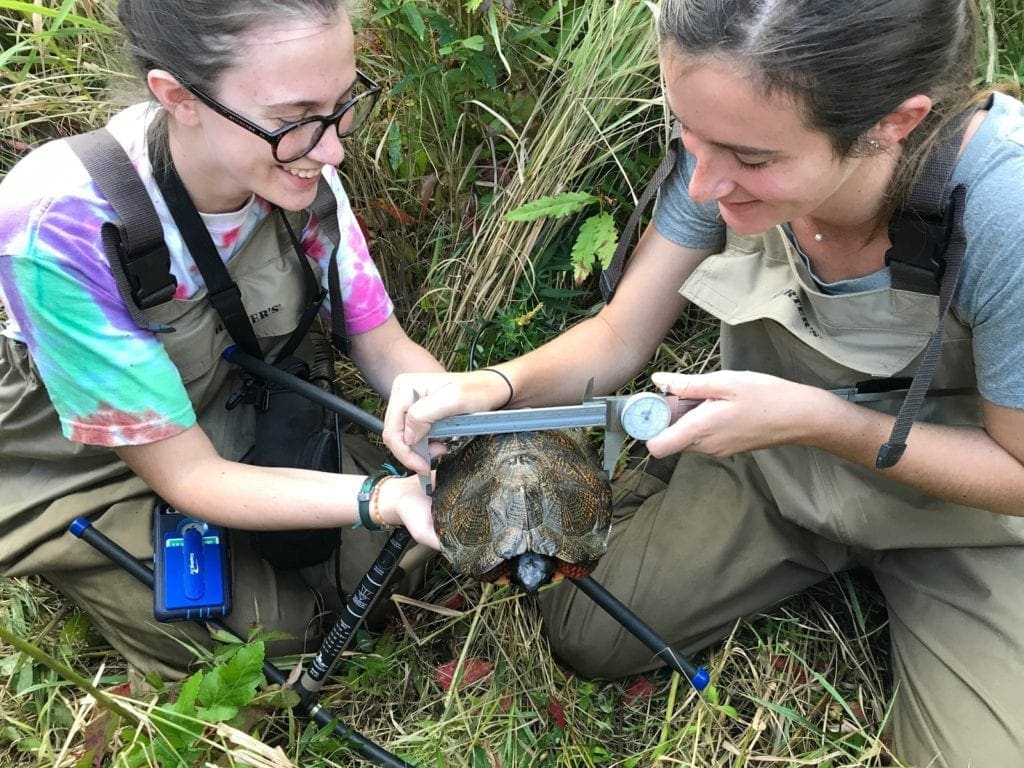Suddenly, he paused, eyes squinting against the increasing blaze of a rising sun, and gestured upstream.
“We passed him. He’s that way,” he called out, catching the attention of two other student volunteers combing nearby banks for any sign of their clever target. Somehow they’d missed him — but that was no surprise. He could be anywhere: cozy under three feet of water or tucked happily between the roots of a tree. He might even be sunning himself beneath a thin layer of sand on a nearby beach, virtually invisible to all but the carefullest passerby.

But twenty minutes later, the jig was up. Going on a hunch, Greg wandered up an embankment and into the woods nearby, antenna in hand, to search. The transmitter’s telling beeps assured that Gotham, one of ten radio-tagged turtles currently wandering the woods and waters surrounding Unity, Maine, promptly got pulled out of the shady protection of an overgrown raspberry bush.
Since spring 2015, Greg and other Unity College students have followed the telling beep of their telemetry gear and waded through deep waters to locate turtles. In partnership with Maine Inland Fisheries and Wildlife, Associate Professor Matt Chatfield initiated a mark-recapture study and a radio-telemetry and habitat mapping project on a nearby Wood Turtle population. At least once a week in fall and spring, students pull on their waders and search for turtles, both tagged and untagged, to collect data on.

“This project and this college are a match made in heaven. We’re all about sustainability science, conservation and protection of the environment here, and this project really speaks to that,” Dr. Chatfield said. “This is a real opportunity to collect information that can be used range-wide to help conserve this turtle in its wild habitat, and also offers integrative experience that is essential in training the next generation of wildlife biologists and environmental problem-solvers. So far it’s been very rewarding — it’s always fulfilling as a professor to watch your students grow.”
As a group, turtles are the most imperiled vertebrates on earth. More than 80 percent of species are already extinct or threatened with extinction. The Wood Turtle is especially at risk, and is experiencing widespread decline throughout much of its range. The species is currently listed as a Species of Special Concern in Maine, and as a Priority 1 Species of Greatest Conservation Need in Maine’s Wildlife Action Plan. But data on Wood Turtles remains sparse, making Unity College’s study a much-needed attempt to fill in some of the gaps. The project will hopefully help scientists understand how Wood Turtle habitat use and movement patterns may be influenced by things like agriculture, road construction, and development.

“This project, through close collaboration between students, faculty and MDIFW biologists, helps fulfill the mission of the College, while simultaneously empowering students through invaluable experiences on a local, yet globally-relevant conservation project,” Unity College President Dr. Melik Peter Khoury said. “Participation in the project through internships, work-study, and volunteering through the campus herpetology club, helps students transition smoothly into graduate programs and further their career goals as biologists or conservation practitioners.”
Each turtle found is tracked with a number, using the same system as the state of Maine because ultimately all of the gathered data goes on to Maine Inland Fisheries and Wildlife. Besides their numbers, most turtles are also given informal names. “Shredder” came about after one turtle kicked so much during his transmitter gluing that he shredded the latex gloves of his handler. Another turtle unexpectedly turned up a solid half mile from his usual haunts one day and gained the name “Roman” for his efforts. “Gotham” got his name for his piercing yellow eyes and dark shell, bringing to mind an image of “the dark knight” for some students.
Dr. Chatfield has watched many of his undergraduates become increasingly interested in the project over three years of study, seeing its influence on their career paths, skillsets, and sense of responsibility. He said he leans on Greg in particular in a way generally reserved in academia for graduate students. He couldn’t be prouder of all the progress he’s seen.



